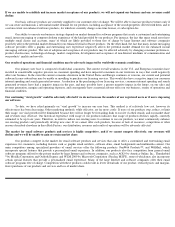Incredimail 2009 Annual Report Download - page 21
Download and view the complete annual report
Please find page 21 of the 2009 Incredimail annual report below. You can navigate through the pages in the report by either clicking on the pages listed below, or by using the keyword search tool below to find specific information within the annual report.
Our operations may be disrupted by the obligations of our personnel to perform military service.
Many of our male employees in Israel, including members of senior management, are obligated to perform up to 36 days of military
reserve duty annually until they reach age 48 and, in the event of a military conflict, could be called to active duty. Our operations could be
disrupted by the absence of a significant number of our employees related to military service or the absence for extended periods of military
service of one or more of our key employees.
Investors and our shareholders generally may have difficulties enforcing a U.S. judgment against us, our executive officers and our
directors or asserting U.S. securities laws claims in Israel.
We are incorporated in Israel and all of our executive officers and most of our directors reside outside the United States. Service of
process upon them may be difficult to effect within the United States. Furthermore, all of our assets and most of the assets of our executive
officers and directors are located outside the United States. Therefore, a judgment obtained against us or any of them in the United States,
including one based on the civil liability provisions of the U.S. federal securities laws may not be collectible in the United States and may not be
enforced by an Israeli court. It also may be difficult for you to assert U.S. securities law claims in original actions instituted in Israel.
The tax benefits available to us require us to meet several conditions and may be terminated or reduced in the future, which would
increase our costs and taxes.
We have generated income and therefore, are able to take advantage of tax exemptions and reductions resulting from the “
Approved
Enterprise”
and "Beneficiary Enterprise" status of our facilities in Israel, albeit, since instituting our dividend policy, to a limited extent. To
remain eligible for these tax benefits, we must continue to meet certain conditions stipulated in the Law for the Encouragement of Capital
Investments, 1959 (the "Investment Law"), and its regulations and the criteria set forth in the specific certificate of approval. If we fail to meet
the required conditions in the future, the tax benefits would be canceled and we could be required to refund any tax benefits we have received
with interest and adjustment for change in Israeli consumer price index. These tax benefits may not be continued in the future at their current
levels or at any level.
Effective April 1, 2005, the Investment Law was amended. As a result, the criteria for investments qualified to receive tax benefits as an
Approved Enterprise were revised. No assurance can be given that we will, in the future, be eligible to receive additional tax benefits under this
law. The termination or reduction of these tax benefits would increase our tax liability in the future, which would reduce our profits or increase
our losses. Additionally, if we increase our activities outside of Israel, for example, by future acquisitions, our increased activities might not be
eligible for inclusion in Israeli tax benefit programs. As a result of the amendment and recent interpretations, if and when we were to discontinue
our policy for distributing dividends, tax-
exempt income generated under the provisions of the new law will subject us to taxes upon distribution
or liquidation and we may be required to record deferred tax liability with respect to such tax-
exempt income, possibly affecting our results in
the future. See “Item 10.E Taxation — Israeli Taxation — Law for the Encouragement of Capital Investments, 1959”
for more information about
these programs.
Risks Related to our Ordinary Shares and their Listing on a Stock Exchange
We incur significant costs as a result of being a public company.
As a public company, we incur significant legal, accounting and other expenses. We incur costs associated with our public company
reporting requirements as well as costs associated with corporate governance requirements, including requirements under the Sarbanes-
Oxley
Act of 2002, the rules of the Nasdaq Stock Market, the provisions of the Israeli Securities Law that apply to dual listed companies (companies
that are listed on the Tel Aviv Stock Exchange ("TASE") and another recognized stock exchange) and the provisions of the Israeli Companies
Law that apply to public companies. For example, as a public company, we have created additional board committees and are required to have
two external directors, pursuant to the Israeli Companies Law. We have also contracted an internal auditor and a consultant for implementation
of and compliance with the requirements under the Sarbanes-Oxley Act. See “Item 5 Operating and Financial Review and Prospects
—
Overview — General and Administrative Expenses” for a discussion of our increased expenses as a result of being a public company.
17
























